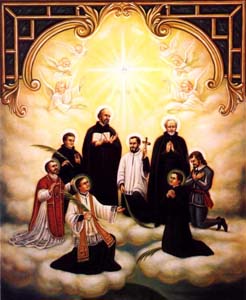Long before I ever conceived of entering graduate studies in liturgy, there was a small study group in college. Among the first important names that came up during this study group was
The Ottaviani Intervention. This essay, it was explained to us, was written and sponsored by some cardinals shortly after the Council, and it really iterated all the major things that were “wrong” about the novus ordo, those elements that were dramatically changed to the detriment of the Catholic faith – an example being the mention of the Parousia, of Christ's Second Coming, in the embolism of the Our Father, thereby speaking of the future presence of Christ after He had just been made present in the Sacrament of the Altar.
After obtaining the book at a used theology book sale, it was with heavy heart and high expectations that I opened it to read this groundbreaking report.
Maybe my senses have been dulled by the “multicultural” liturgy that was forced upon me at the FDLC conference last week, but the
Ottaviani Intervention didn't shock me. In fact, I thought its authors were overreacting in quite a number of places. I must be less traditional than I'd thought.
Some of the accusations that didn't surprise me were probably very potent ones in their day, but have lost much of their fire through repetition. I really don't get excited anymore that the notion of sacrifice was completely excised from the offertory rite. The special effects in Star Wars (the original trilogy, of course!) were groundbreaking in their day, but when I watch them now, they're old hat at best. Doesn't make them less true, but explains my lack of response.
Other issues that I dismissed have been nuanced over time and corrected with translation. We
are on the third typical edition of the Missal of Paul VI (i.e., it's been revised twice since 1969).
There was some hair-splitting and stretching, of course. Apparently, by having the priest say, “Do this in memory of me” rather than “As often as ye shall do these things, in memory of me shall ye do them,” the Church has caused people to lose focus on the sacramental action being re-presented, and instead think of the Eucharist as a commemoration. I understand that it's a big deal to change any text in the canon, but this comes from the very next verse in Scripture and means so nearly the same thing...
Then there are the overstatements. Most of these had to do with the novus ordo being Protestant in theology. As much as I am usually wildly entertained by inflammatory statements about Protestants made by Catholics trying to preserve Catholic identity (favorite: Ralph Adams Cram!), the statements in the
Ottaviani Intervention – in addition to being vaguer and much less witty – just strike me as untrue, at least judging by today's variety of Protestants.
But the reaction that surprised me most was when I thought, “Oh. Well, that assessment is true, but actually I think you're kind of wrong for caring.” Theological ideas I have always taken for granted – like the baptismal priesthood of the laity (different in kind from the ordained priesthood but present nonetheless) – were held up as examples of the crazy ideas promoted by this liturgical reform.
Too, I thought its authors were just as nearsightedly obsessed with sacrifice as modern whiny traditionalists. (Admittedly, both also acknowledge the doxological element, the need of glorifying the Triune God, so I suppose they're two-trick ponies.) I don't mean to suggest that sacrifice is not an absolutely essential element of the liturgy, especially the Eucharistic liturgy (although, in light of Ratzinger's statements in
Spirit of the Liturgy, I can't help but ask what is meant by sacrifice, but that's a topic for another time). But where is their eschatology? What about the legitimate communal aspect of liturgy, which is of its very nature a communal act? What about the communicant's moment of intimacy with the God of all creation? Not to mention the liturgy's cosmic dimension? Yes, sacrifice is absolutely essential, but let's not be reductionist here, people.
It's been forty years since the
novus ordo was promulgated. The Church is still standing. One can argue that she'd be in better shape now had the Mass never been reformed – but one could make just as strong an argument that she'd be in worse shape. At this point in time, despite the various traditionalist communities around the world, the piety of the vast majority of Catholics has been shaped and formed by the
novus ordo. Certainly some of the theological trends preserved more strongly in the old liturgy are less clearly understood by many. But the world has not become Protestant. Catholicism is as virile as ever.
Is a book like this worth reading, for a scholar of the liturgy? Sure. It was a landmark book in its day: shocking, unusual, and insightful. Is it likely to be relevant to the average interested reader? Less so. If you're looking for traddy liturgical books, I'd still send you to the early 20th century long before I'd recommend Cardinal Ottaviani..




